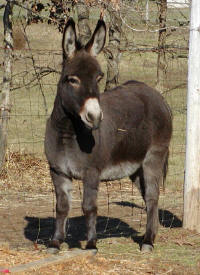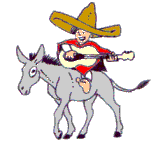The Miniature Donkey
![]()
![]()
The miniature donkey also known as the Sardinian donkey originated in the Mediterranean islands of Sicily and Sardinia. There are currently an estimated 50000 miniature donkeys in the United States of which close to 40000 are registered with the Miniature Donkey Registry.
Miniature donkeys range in height from 26" to 36" with the average height around 34". They weigh between 200 and 300 Lbs and the most common color is gray-dun/slate or mouse color. Other colors include brown, black brown, black (rare), red/sorrel, ivory (rare) and spotted. The donkey usually has a dark line along his back and across his shoulders.
The donkey has a life expectancy of 25-30 years. Donkeys are herd animals and need to be given a companion. If another donkey is not available at least provide a pony, lama, goat or cow. Sometimes they also make friends with the family dog.
Uses of the Miniature Donkey
The miniature donkey has many uses, the most common being a pet or companion animal. With his long life expectancy a donkey can truly be a friend/companion for life.
Some people train their donkeys to pull a cart or wagon which is easily accomplished. They often take part in parades or show them at other events. There are people that take their donkey to schools and nursing homes for entertainment and education. The donkey can be displayed in petting zoos, zoos, nativity scenes, or he can be easily trained for smaller children to ride. He may be a back packers companion and can be conditioned to carry about 100 lbs. of cargo.
The donkey can also be kept as a guard animal to guard against dogs or coyotes. They protect newborn calves or herds of goats. If used as a guard animal one should consider the size of the donkey and the remoteness of the area. A 300 lbs. donkey may guard the same way as a large donkey by instinct - and may be able to fend off a neighbor's dog - but will likely lose out to aggressive, larger dogs or packs of dogs/coyotes. A larger donkey is more suitable for this purpose.
We have talked to an increasing number of people that just inquired about a donkey to hear him bray. For this purpose a jack is most suitable since it is his nature to bray. Jennets on the other hand remain quiet (unless it's feeding time!)
Care
The miniature donkey can be kept on small pastures. He naturally requires less feed than a large donkey. All donkeys love to roll and he will find a rolling spot.
The miniature donkey may be more suitable for small children. A gelding or a jennet has a very quiet personality. A jack should be watched closely and never be left alone with small children. They may be just as loving but can become more aggressive when there are jennets around. Therefore a jack should be gelded if he is to be a child's pet. A gelding makes a wonderful, well balanced and quiet companion.
It is easy to overfeed a donkey. All he really requires is a good pasture or good grass hay in the winter and a mineral block for him to lick on. Alfalfa hay is known to be too rich for donkeys and should only be used sparingly. Sweet feed or grain feed is usually not necessary in mild climates. If your donkey gets too thin during the winter feed him some 10% sweet feed. But be careful not to overfeed him since a fat donkey will have a hard time to lose weight. He may not be able to loose a neck fat roll at all.
The donkey needs to be wormed a minimum of two times a year (best every 3-4 months) and with many animals in a small area as often as every 60 days. He requires regular hoof care (every 6-8 weeks) depending on how quick his hooves grow.
A minimum of a tetanus shot should be given once a year to protect him in case of injury. Tetanus shots are available also as an affordable combination vaccine that guards against the most common diseases in one's area such as encephalitis and influenza.
Most donkeys love to be groomed and to be pet. A donkey is trainable regardless of age and can be taught many different things. However, it is very important to give him time and not to force or physically punish him. He will learn better when given time, patience and love. A donkey will not forget punishment and if beaten or physically abused he will never learn to trust. Even "burros" that are taken from the wild are trainable and can be gentled in short periods of time without physical abuse. Therefore the "traditional horsebreaking" techniques will never work with a donkey. Please don't try.
![]()
The Miniature Donkey
Testimonials from new "Donkey Parents"
Vicious Dog Attacks (contains a disturbing picture)
Please click the link below to E-mail us:
The Little Friends Ranch
Nadia Attia-O'Bryan
1034 Carl Crisp Rd.
Almo, KY 42020
270-753-9270
since 8. Feb. 04

